Deck 9: Global Markets in Action
Question
Question
Question
Question
Question
Question
Question
Question
Question
Question
Question
Question
Question
Question
Question
Question
Question
Question
Question
Question
Question
Question
Question
Question
Question
Question
Question
Question
Question
Question
Question
Question
Question
Question
Question
Question
Question
Question
Question
Question
Question
Question
Question
Question
Question
Question
Question
Question
Question
Question
Question
Question
Question
Question
Question
Question
Question
Question
Question
Question
Question
Question
Question
Question
Question
Question
Question
Question
Question
Question
Question
Question
Question
Question
Question
Question
Question
Question
Question
Question

Unlock Deck
Sign up to unlock the cards in this deck!
Unlock Deck
Unlock Deck
1/108
Play
Full screen (f)
Deck 9: Global Markets in Action
1
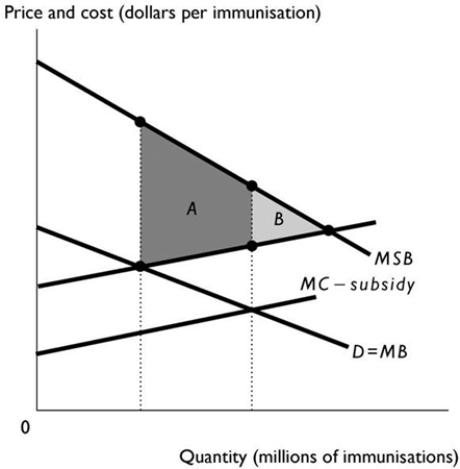
Australia imports t-shirts from Asia. As a result, Australian consumers pay ________ otherwise and Asian producers receive ________ otherwise.
A) the same price as; the same price as
B) a lower price than; a higher price than
C) a lower price than; a lower price than
D) a higher price than; a higher price than
E) a higher price than; a lower price than
a lower price than; a higher price than
2

If Australia starts to import a good that had previously been produced in Australia, the market price of the good in Australia
A) rises.
B) falls.
C) remains constant.
D) either remains constant or rises, depending on whether the supply of the good stays the same or increases.
E) There is not enough information to answer the question because we need to know if the market price in Australia had been above or below the world market price before trade began.
falls.
3

If the world price of a good is below the no-trade domestic price, a country
A) will benefit from importing the good.
B) cannot benefit from trade.
C) has a comparative advantage in the production of that good.
D) will benefit from exporting the good.
E) will not engage in trade for that good.
will benefit from importing the good.
4
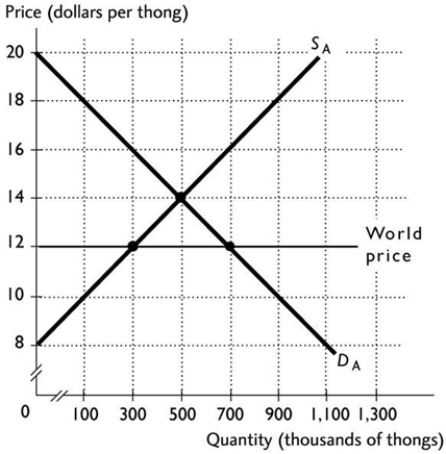
The above figure shows the Australian market for thongs. With international trade, the equilibrium price in Australia is ________ and Australia ________ thongs.
A) $14; imports
B) $12; imports
C) $12; does not trade
D) $12; exports
E) $14; does not trade

Unlock Deck
Unlock for access to all 108 flashcards in this deck.
Unlock Deck
k this deck
5

A nation has a comparative advantage in a good when it has a
A) tariff in place protecting the producers of the good.
B) lower opportunity cost of producing the good.
C) higher absolute cost of producing the good.
D) lower absolute cost of producing the good.
E) higher opportunity cost of producing the good.

Unlock Deck
Unlock for access to all 108 flashcards in this deck.
Unlock Deck
k this deck
6

A country exports a good if
A) the world price of the good is above the country's no-trade equilibrium price.
B) the world price of the good is below the country's no-trade equilibrium price.
C) it has a high opportunity cost of production.
D) it cannot import the good.
E) the quantity demanded of the good in the country is greater than the quantity supplied at the world price.

Unlock Deck
Unlock for access to all 108 flashcards in this deck.
Unlock Deck
k this deck
7

Goods and services that Australia buys from other nations are called
A) bartered goods.
B) imports.
C) exports.
D) world goods.
E) exchanges.

Unlock Deck
Unlock for access to all 108 flashcards in this deck.
Unlock Deck
k this deck
8
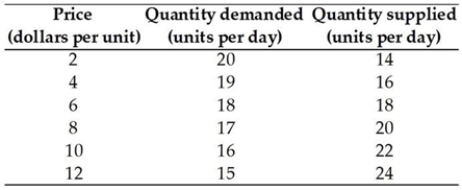
The table above has the domestic demand and domestic supply schedules for a good. According to the table, the no-trade price of the good is
A) $2.
B) $6.
C) $4.
D) $8.
E) $10.

Unlock Deck
Unlock for access to all 108 flashcards in this deck.
Unlock Deck
k this deck
9
With no international trade, the Australian price of wheat is lower than the world price of wheat. This indicates that Australia ________ a comparative advantage in the production of wheat and, with international trade, Australia will ________ wheat.
A) has; import
B) has; not trade
C) has; export
D) might have; export
E) does not have; export
A) has; import
B) has; not trade
C) has; export
D) might have; export
E) does not have; export

Unlock Deck
Unlock for access to all 108 flashcards in this deck.
Unlock Deck
k this deck
10

Of the following, ________ account(s) for the largest share of imports into Australia.
A) computers
B) clothing and footwear
C) tourism
D) chemicals
E) food and drinks

Unlock Deck
Unlock for access to all 108 flashcards in this deck.
Unlock Deck
k this deck
11

Australia imports t-shirts because
A) foreign nations have a lower opportunity cost of production.
B) Australia must import goods and services from other countries so that they can develop economically.
C) it is a dangerous job to produce them.
D) Australia has a lower opportunity cost of production.
E) foreign economies have an absolute advantage in their production.

Unlock Deck
Unlock for access to all 108 flashcards in this deck.
Unlock Deck
k this deck
12
When a country exports a good because the world price is higher than the no-trade domestic price, domestic purchases of the good ________ and domestic production of the good ________.
A) increase; decreases
B) decrease; increases
C) increase; increases
D) do not change; increases
E) decrease; decreases
A) increase; decreases
B) decrease; increases
C) increase; increases
D) do not change; increases
E) decrease; decreases

Unlock Deck
Unlock for access to all 108 flashcards in this deck.
Unlock Deck
k this deck
13

If a nation imports a good that can be domestically produced, what happens to the quantity consumed of the good and why?
A) The quantity consumed remains constant because the price is unchanged.
B) The quantity consumed decreases because the market price increases.
C) The quantity consumed increases because the nation produces more of the good.
D) The quantity consumed decreases because the market price decreases.
E) The quantity consumed increases because the market price decreases.

Unlock Deck
Unlock for access to all 108 flashcards in this deck.
Unlock Deck
k this deck
14

All of the following statements about Australia are true EXCEPT
A) Australia is a small open trading nation.
B) the largest imports are manufactured goods.
C) imports are a larger percentage of total expenditure than exports.
D) services account for a larger portion of Australian exports than Australian imports.
E) Australia usually imports more than it exports.

Unlock Deck
Unlock for access to all 108 flashcards in this deck.
Unlock Deck
k this deck
15

A country exports the goods
A) that the economy can produce the most of.
B) for which its domestic prices are very high compared to world prices.
C) that the economy can produce at the relatively lowest opportunity cost.
D) that it cannot sell domestically.
E) in which it has a comparative disadvantage.

Unlock Deck
Unlock for access to all 108 flashcards in this deck.
Unlock Deck
k this deck
16

As a result of importing a good, domestic consumers ________ the quantity consumed and the price of the good ________.
A) increase; falls
B) decrease; falls
C) increase; rises
D) decrease; rises
E) increase; does not change

Unlock Deck
Unlock for access to all 108 flashcards in this deck.
Unlock Deck
k this deck
17

The above figure shows the Australian market for thongs. When there is no international trade, the Australian price is ________ per thong and the Australian quantity is ________ thongs.
A) $12; 300,000
B) $14; 500,000
C) $14; 700,000
D) $12; 700,000
E) $14; 300,000

Unlock Deck
Unlock for access to all 108 flashcards in this deck.
Unlock Deck
k this deck
18

The fundamental force that drives trade between nations is
A) the government.
B) absolute advantage.
C) free trade agreements.
D) comparative advantage.
E) legal treaties.

Unlock Deck
Unlock for access to all 108 flashcards in this deck.
Unlock Deck
k this deck
19

Goods and services that Australia sells to other nations are called
A) world goods.
B) imports.
C) exports.
D) exchanges.
E) bartered goods.

Unlock Deck
Unlock for access to all 108 flashcards in this deck.
Unlock Deck
k this deck
20

The above figure shows the Australian market for thongs. With international trade, Australian consumers buy ________ thongs and Australian producers produce ________ thongs.
A) 700,000; 500,000
B) 700,000; 300,000
C) 300,000; 700,000
D) 500,000; 500,000
E) 500,000; 300,000

Unlock Deck
Unlock for access to all 108 flashcards in this deck.
Unlock Deck
k this deck
21
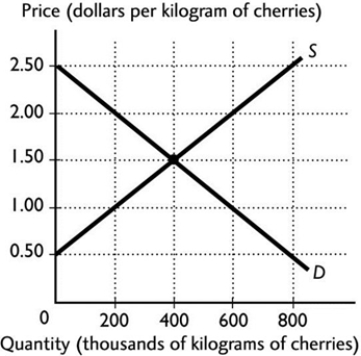
The figure above shows the Australian demand and Australian supply curves for cherries. At a world price of $2 per kilogram, once international trade occurs, the production of cherries in Australia will equal
A) 200,000 kilograms.
B) 400,000 kilograms.
C) 600,000 kilograms.
D) 800,000 kilograms.
E) 0 kilograms.

Unlock Deck
Unlock for access to all 108 flashcards in this deck.
Unlock Deck
k this deck
22

The figure above shows the Australian demand and Australian supply curves for cherries. Suppose the world price of cherries is $2 per kilogram. At this price, Australian consumption of cherries will equal
A) 200,000 kilograms.
B) 400,000 kilograms.
C) 600,000 kilograms.
D) 800,000 kilograms.
E) 0 kilograms.

Unlock Deck
Unlock for access to all 108 flashcards in this deck.
Unlock Deck
k this deck
23
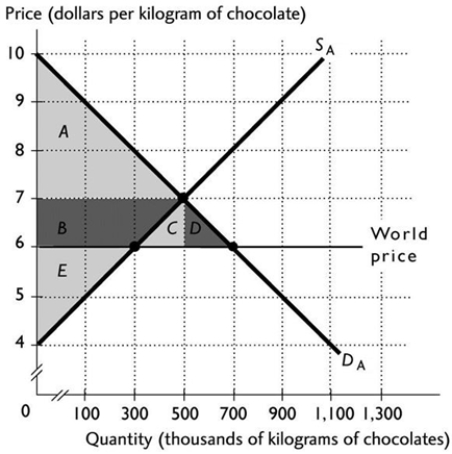
When a nation exports a good or service in which it has a comparative advantage, employment in that industry
A) decreases.
B) stays the same.
C) increases.
D) might change, but more information about what else the country exports is needed.
E) might change, but more information about what the country imports is needed.

Unlock Deck
Unlock for access to all 108 flashcards in this deck.
Unlock Deck
k this deck
24

The table above has the domestic demand and domestic supply schedules for a good. If the world price of the good is $10 and international trade occurs, then, according to the table,
A) domestic production is higher before trade than after trade.
B) the country exports 6 units a day.
C) the country imports 6 units a day.
D) the country imports 16 units a day.
E) the country exports 22 units a day.

Unlock Deck
Unlock for access to all 108 flashcards in this deck.
Unlock Deck
k this deck
25
When a nation starts importing a good or service, domestic employment in that industry
A) decreases.
B) increases.
C) stays the same.
D) might change, but more information about what else the country imports is needed to determine if employment increases, decreases or does not change.
E) might change, but more information about what the country exports is needed to determine if employment increases, decreases or does not change.
A) decreases.
B) increases.
C) stays the same.
D) might change, but more information about what else the country imports is needed to determine if employment increases, decreases or does not change.
E) might change, but more information about what the country exports is needed to determine if employment increases, decreases or does not change.

Unlock Deck
Unlock for access to all 108 flashcards in this deck.
Unlock Deck
k this deck
26

The above figure shows the Australian market for chocolate. With international trade, consumer surplus is equal to
A) area A.
B) area C + area D.
C) area B + area C + area D.
D) area E.
E) area A + area B + area C + area D.

Unlock Deck
Unlock for access to all 108 flashcards in this deck.
Unlock Deck
k this deck
27
A nation will import a good if its no-trade, domestic
A) price is greater than the world price.
B) quantity is greater than the world quantity.
C) price is equal to the world price.
D) quantity is less than the world quantity.
E) price is less than the world price.
A) price is greater than the world price.
B) quantity is greater than the world quantity.
C) price is equal to the world price.
D) quantity is less than the world quantity.
E) price is less than the world price.

Unlock Deck
Unlock for access to all 108 flashcards in this deck.
Unlock Deck
k this deck
28
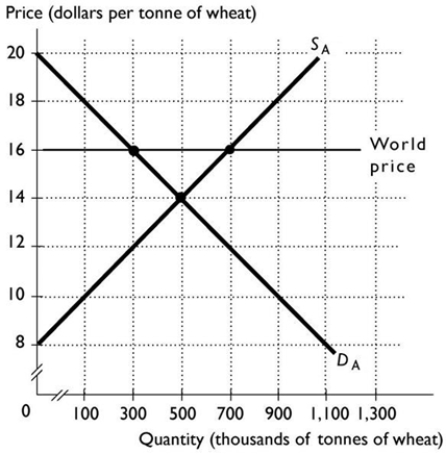
The above figure shows the Australian market for wheat. With international trade, Australia exports ________ of wheat.
A) 700,000 tonnes
B) 500,000 tonnes
C) 300,000 tonnes
D) 400,000 tonnes
E) None of the above answers is correct because Australia imports wheat.

Unlock Deck
Unlock for access to all 108 flashcards in this deck.
Unlock Deck
k this deck
29

The figure above shows the Australian demand and Australian supply curves for cherries. In the absence of international trade, cherry farmers would receive ________ per kilogram of cherries.
A) $1.00
B) $2.50
C) $0.50
D) $2.00
E) $1.50

Unlock Deck
Unlock for access to all 108 flashcards in this deck.
Unlock Deck
k this deck
30
When a nation starts importing a good or service, the domestic production of the good or service
A) decreases.
B) increases.
C) might change, but more information about what the country exports is needed to determine if production increases, decreases or does not change.
D) stays the same.
E) might change, but more information about what else the country imports is needed to determine if production increases, decreases or does not change.
A) decreases.
B) increases.
C) might change, but more information about what the country exports is needed to determine if production increases, decreases or does not change.
D) stays the same.
E) might change, but more information about what else the country imports is needed to determine if production increases, decreases or does not change.

Unlock Deck
Unlock for access to all 108 flashcards in this deck.
Unlock Deck
k this deck
31
International trade benefits
A) both the exporter and the importer.
B) only the exporter.
C) the exporter at all times and sometimes also the importer.
D) only the importer.
E) neither the exporter nor the importer.
A) both the exporter and the importer.
B) only the exporter.
C) the exporter at all times and sometimes also the importer.
D) only the importer.
E) neither the exporter nor the importer.

Unlock Deck
Unlock for access to all 108 flashcards in this deck.
Unlock Deck
k this deck
32

The above figure shows the Australian market for chocolate. With international trade, the gain in total surplus is equal to
A) area B.
B) area C + area D.
C) area B + area C + area D.
D) area A + area B + area C + area D.
E) area B + area C + area D + area E.

Unlock Deck
Unlock for access to all 108 flashcards in this deck.
Unlock Deck
k this deck
33
If the United States exports planes to Brazil and imports ethanol from Brazil, the price received by U.S. producers of planes ________, and the price received by Brazilian producers of ethanol ________.
A) falls; rises
B) rises; falls
C) falls; falls
D) does not change; does not change
E) rises; rises
A) falls; rises
B) rises; falls
C) falls; falls
D) does not change; does not change
E) rises; rises

Unlock Deck
Unlock for access to all 108 flashcards in this deck.
Unlock Deck
k this deck
34
When a nation exports a good, its ________ surplus decreases and its ________ surplus increases.
A) consumer; consumer
B) producer; consumer
C) producer; producer
D) consumer; producer
E) total; consumer
A) consumer; consumer
B) producer; consumer
C) producer; producer
D) consumer; producer
E) total; consumer

Unlock Deck
Unlock for access to all 108 flashcards in this deck.
Unlock Deck
k this deck
35
When a nation imports a good, its ________ surplus decreases and its ________ surplus increases.
A) consumer; producer
B) total; consumer
C) producer; consumer
D) consumer; consumer
E) producer; producer
A) consumer; producer
B) total; consumer
C) producer; consumer
D) consumer; consumer
E) producer; producer

Unlock Deck
Unlock for access to all 108 flashcards in this deck.
Unlock Deck
k this deck
36
When a nation imports a good, its ________ surplus increases and its ________ surplus increases.
A) producer; total
B) consumer; consumer
C) total; consumer
D) consumer; producer
E) producer; producer
A) producer; total
B) consumer; consumer
C) total; consumer
D) consumer; producer
E) producer; producer

Unlock Deck
Unlock for access to all 108 flashcards in this deck.
Unlock Deck
k this deck
37

The figure above shows the Australian demand and Australian supply curves for cherries. At a world price of $2 per kilogram, once international trade occurs, the total exports of cherries from Australia to other nations equals
A) 200,000 kilograms.
B) 400,000 kilograms.
C) 600,000 kilograms.
D) 800,000 kilograms.
E) 0 kilograms.

Unlock Deck
Unlock for access to all 108 flashcards in this deck.
Unlock Deck
k this deck
38

The above figure shows the Australian market for chocolate. With no international trade, consumer surplus is equal to ________ and producer surplus is equal to ________.
A) area A + area B + area C + area D; area E
B) area E; area A + area B + area C + area D
C) area B + area C + area D; area A + area E
D) area A; area E
E) area C + area D; area B + area E

Unlock Deck
Unlock for access to all 108 flashcards in this deck.
Unlock Deck
k this deck
39

The figure above shows the Australian demand and Australian supply curves for cherries. In the absence of international trade, how many kilograms of cherries would Australian farmers produce?
A) 200,000 kilograms
B) 400,000 kilograms
C) 600,000 kilograms
D) 800,000 kilograms
E) 0 kilograms

Unlock Deck
Unlock for access to all 108 flashcards in this deck.
Unlock Deck
k this deck
40
Australia exports a good if its no-trade Australian price is ________ the world price. With international trade, Australian production of the good ________ compared to the level of no-trade production.
A) the same as; does not change
B) the same as; increases
C) lower than; increases
D) higher than; does not change
E) higher than; increases
A) the same as; does not change
B) the same as; increases
C) lower than; increases
D) higher than; does not change
E) higher than; increases

Unlock Deck
Unlock for access to all 108 flashcards in this deck.
Unlock Deck
k this deck
41
A tariff is
A) a subsidy granted to imports.
B) any non-subsidy used to increase trade.
C) any non-tax action used to restrict trade.
D) a tax imposed on exports.
E) a tax imposed on imports.
A) a subsidy granted to imports.
B) any non-subsidy used to increase trade.
C) any non-tax action used to restrict trade.
D) a tax imposed on exports.
E) a tax imposed on imports.

Unlock Deck
Unlock for access to all 108 flashcards in this deck.
Unlock Deck
k this deck
42
The imposition of a tariff will typically ________ government revenue and ________ domestic production of the good.
A) increase; increase
B) increase; not change
C) decrease; decrease
D) decrease; increase
E) increase; decrease
A) increase; increase
B) increase; not change
C) decrease; decrease
D) decrease; increase
E) increase; decrease

Unlock Deck
Unlock for access to all 108 flashcards in this deck.
Unlock Deck
k this deck
43
If Australia imposes a tariff on foreign chocolate, how are Australian buyers of chocolate affected?
A) The price they pay for chocolate falls but they consume less chocolate because less is imported.
B) The quantity they consume is unchanged.
C) The price they pay for chocolate falls and they consume more chocolate.
D) The price they pay for chocolate rises.
E) Their demand for chocolate increases because Australian production of chocolate increases.
A) The price they pay for chocolate falls but they consume less chocolate because less is imported.
B) The quantity they consume is unchanged.
C) The price they pay for chocolate falls and they consume more chocolate.
D) The price they pay for chocolate rises.
E) Their demand for chocolate increases because Australian production of chocolate increases.

Unlock Deck
Unlock for access to all 108 flashcards in this deck.
Unlock Deck
k this deck
44
When a nation exports a good or service, the nation's consumer surplus ________, its producer surplus ________, and its total surplus ________.
A) increases; decreases; decreases
B) decreases; decreases; decreases
C) increases; decreases; increases
D) increases; increases; increases
E) decreases; increases; increases
A) increases; decreases; decreases
B) decreases; decreases; decreases
C) increases; decreases; increases
D) increases; increases; increases
E) decreases; increases; increases

Unlock Deck
Unlock for access to all 108 flashcards in this deck.
Unlock Deck
k this deck
45
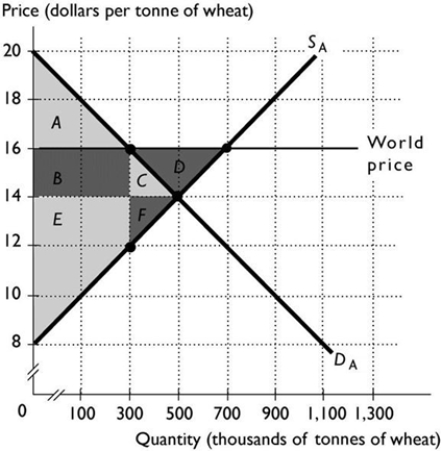
When a nation exports a good, its ________ surplus increases, and when it imports a good, its ________ surplus increases.
A) producer; consumer
B) total; consumer
C) consumer; producer
D) producer; producer
E) consumer; consumer

Unlock Deck
Unlock for access to all 108 flashcards in this deck.
Unlock Deck
k this deck
46

When a nation exports a good, its ________ surplus increases, and when it imports a good, its ________ surplus increases.
A) consumer; consumer
B) producer; producer
C) total; total
D) total; consumer
E) producer; consumer

Unlock Deck
Unlock for access to all 108 flashcards in this deck.
Unlock Deck
k this deck
47
Suppose the world price of widgets is $5 each. If a widget-importing country imposed a $2 per widget tariff, what price would that country's consumers pay for widgets?
A) $3
B) $7
C) $5
D) $10
E) A price that is greater than $5 and less than $7.
A) $3
B) $7
C) $5
D) $10
E) A price that is greater than $5 and less than $7.

Unlock Deck
Unlock for access to all 108 flashcards in this deck.
Unlock Deck
k this deck
48
Looking at the average tariff rate in Australia since 1930, we see that
A) while we talk about free trade, tariff levels have risen over the last 30 years.
B) at first tariffs declined, but have recently risen.
C) tariff levels have remained high at over 50 per cent throughout the period.
D) tariffs have trended downward since the early 1930s.
E) tariffs have trended downwards since 1947.
A) while we talk about free trade, tariff levels have risen over the last 30 years.
B) at first tariffs declined, but have recently risen.
C) tariff levels have remained high at over 50 per cent throughout the period.
D) tariffs have trended downward since the early 1930s.
E) tariffs have trended downwards since 1947.

Unlock Deck
Unlock for access to all 108 flashcards in this deck.
Unlock Deck
k this deck
49
When a nation exports a good, its ________ surplus decreases and its ________ surplus increases.
A) total; consumer
B) producer; producer
C) consumer; consumer
D) producer; consumer
E) consumer; total
A) total; consumer
B) producer; producer
C) consumer; consumer
D) producer; consumer
E) consumer; total

Unlock Deck
Unlock for access to all 108 flashcards in this deck.
Unlock Deck
k this deck
50

The above figure shows the Australian market for wheat. With international trade, consumer surplus is equal to
A) area A + area B + area C + area D.
B) area A.
C) area E + area F.
D) area A + area B + area C.
E) area B + area C + area D.

Unlock Deck
Unlock for access to all 108 flashcards in this deck.
Unlock Deck
k this deck
51

The above figure shows the Australian market for wheat. With international trade, ________ is the transfer of surplus from consumers to producers.
A) area D
B) area B + area C + area D
C) area C + area F
D) area B + area C
E) area C + area D

Unlock Deck
Unlock for access to all 108 flashcards in this deck.
Unlock Deck
k this deck
52

The above figure shows the Australian market for wheat. With no international trade, consumer surplus is equal to ________ and producer surplus is equal to ________.
A) area B + area C + area D; area E + area F
B) area A + area B + area C + area D; area E + area F
C) area A; area B + area C + area E + area F
D) area A + area B + area C; area E + area F
E) area E + area F; area A

Unlock Deck
Unlock for access to all 108 flashcards in this deck.
Unlock Deck
k this deck
53

When a country imports a good, the ________ in consumer surplus is ________ the ________ in producer surplus.
A) decrease; larger than; increase
B) increase; smaller than; decrease
C) increase; larger than; decrease
D) increase; equal to; decrease
E) decrease; smaller than; increase

Unlock Deck
Unlock for access to all 108 flashcards in this deck.
Unlock Deck
k this deck
54
In the wake of a worsening trade relationship with China, some Australians have called for an increase in tariffs on Chinese products coming into Australia. If higher tariffs are imposed on clothing produced in China, the price of clothing in Australia will
A) increase.
B) decrease.
C) not change.
D) first increase then decrease.
E) first decrease then increase.
A) increase.
B) decrease.
C) not change.
D) first increase then decrease.
E) first decrease then increase.

Unlock Deck
Unlock for access to all 108 flashcards in this deck.
Unlock Deck
k this deck
55
Australian tariffs on Canadian timber products have led to ________ the production of timber products in Australia.
A) an increase in
B) the elimination of
C) no change in
D) a decrease in
E) making illegal the
A) an increase in
B) the elimination of
C) no change in
D) a decrease in
E) making illegal the

Unlock Deck
Unlock for access to all 108 flashcards in this deck.
Unlock Deck
k this deck
56
Which of the following is correct? i. Australian total surplus decreases when Australia exports a good.
Ii) Australian total surplus decreases when Australia imports a good.
Iii) Australian total surplus increases when Australia imports a good and when it exports a good.
A) i and ii
B) ii only
C) iii only
D) i only
E) None of the above because the Australian total surplus does not change as a result of trade.
Ii) Australian total surplus decreases when Australia imports a good.
Iii) Australian total surplus increases when Australia imports a good and when it exports a good.
A) i and ii
B) ii only
C) iii only
D) i only
E) None of the above because the Australian total surplus does not change as a result of trade.

Unlock Deck
Unlock for access to all 108 flashcards in this deck.
Unlock Deck
k this deck
57
Since the early 2000s, the average Australian tariff rate has been
A) between 10 per cent and 15 per cent.
B) less than 20 per cent.
C) between 16 per cent and 25 per cent.
D) less than 10 per cent.
E) between 26 per cent and 35 per cent.
A) between 10 per cent and 15 per cent.
B) less than 20 per cent.
C) between 16 per cent and 25 per cent.
D) less than 10 per cent.
E) between 26 per cent and 35 per cent.

Unlock Deck
Unlock for access to all 108 flashcards in this deck.
Unlock Deck
k this deck
58

International trade is definitely in the social interest if
A) total surplus increases.
B) consumer surplus increases.
C) producer surplus does not decrease.
D) producer surplus increases.
E) consumer surplus does not decrease.

Unlock Deck
Unlock for access to all 108 flashcards in this deck.
Unlock Deck
k this deck
59
Imposing a tariff on a good leads to a ________ in the price of the product and ________ in imports.
A) rise; a decrease
B) fall; an increase
C) rise; no change
D) rise; an increase
E) fall; a decrease
A) rise; a decrease
B) fall; an increase
C) rise; no change
D) rise; an increase
E) fall; a decrease

Unlock Deck
Unlock for access to all 108 flashcards in this deck.
Unlock Deck
k this deck
60
The imposition of tariffs on Korean steel would lead to ________ in imports of Korean steel to Australia and ________ the price of steel in Australia.
A) an increase; an increase in
B) a decrease; no change in
C) an increase; a decrease in
D) no change; an increase in
E) a decrease; an increase in
A) an increase; an increase in
B) a decrease; no change in
C) an increase; a decrease in
D) no change; an increase in
E) a decrease; an increase in

Unlock Deck
Unlock for access to all 108 flashcards in this deck.
Unlock Deck
k this deck
61
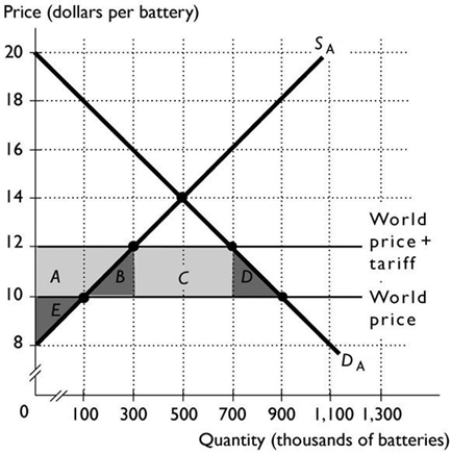
The above figure shows the Australian market for replacement mobile phone batteries. When there is no international trade, the equilibrium price is ________ per battery and when there is international trade the equilibrium price is ________ per battery.
A) $16; $12
B) $12; $14
C) $12; $16
D) $16; $14
E) $14; $12

Unlock Deck
Unlock for access to all 108 flashcards in this deck.
Unlock Deck
k this deck
62
Country A imports 1,000 cars per month. After imposing a $50 per car tariff, imports fall to 800 cars per month. How much does Country A's government collect in tariff revenue?
A) $40,000
B) $50,000
C) $10,000
D) $60,000
E) $90,000
A) $40,000
B) $50,000
C) $10,000
D) $60,000
E) $90,000

Unlock Deck
Unlock for access to all 108 flashcards in this deck.
Unlock Deck
k this deck
63
If the Australian government imposes a tariff on imported steel, who else besides Australian steel producers gains from the tariff?
A) Australian steel consumers.
B) The Australian government.
C) Foreign exporters of steel.
D) Australian importers of steel.
E) The foreign government.
A) Australian steel consumers.
B) The Australian government.
C) Foreign exporters of steel.
D) Australian importers of steel.
E) The foreign government.

Unlock Deck
Unlock for access to all 108 flashcards in this deck.
Unlock Deck
k this deck
64
A quota is
A) the minimum amount that domestic firms can dump.
B) a specified maximum amount that can be imported.
C) a tax on imported goods or services.
D) a tariff on exports of goods or services.
E) a specified minimum amount that must be imported.
A) the minimum amount that domestic firms can dump.
B) a specified maximum amount that can be imported.
C) a tax on imported goods or services.
D) a tariff on exports of goods or services.
E) a specified minimum amount that must be imported.

Unlock Deck
Unlock for access to all 108 flashcards in this deck.
Unlock Deck
k this deck
65
Which type of policy instrument raises the most revenue for the government?
A) Voluntary export restraints
B) A tariff
C) A quota
D) If they are set at the same level, all of the above raise the same amount of revenue.
E) None of the above answers is correct because none of the policy instruments raises revenue for the government.
A) Voluntary export restraints
B) A tariff
C) A quota
D) If they are set at the same level, all of the above raise the same amount of revenue.
E) None of the above answers is correct because none of the policy instruments raises revenue for the government.

Unlock Deck
Unlock for access to all 108 flashcards in this deck.
Unlock Deck
k this deck
66
If a tariff is imposed on imports of prawns into Australia, Australian consumer surplus from prawns will ________ and Australian total surplus from prawns will ________.
A) increase; increase
B) increase; decrease
C) decrease; increase
D) decrease; decrease
E) increase; not change
A) increase; increase
B) increase; decrease
C) decrease; increase
D) decrease; decrease
E) increase; not change

Unlock Deck
Unlock for access to all 108 flashcards in this deck.
Unlock Deck
k this deck
67
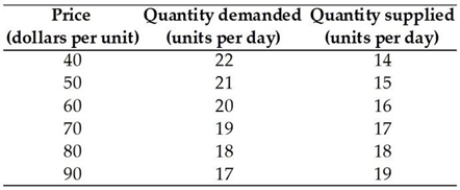
The table above gives the domestic demand and supply schedules for a good. Suppose the world price of the good is $40 and the government imposes a $20 per unit tariff. How much will the government collect as tariff revenue?
A) $320
B) $360
C) $80
D) $240
E) $160

Unlock Deck
Unlock for access to all 108 flashcards in this deck.
Unlock Deck
k this deck
68
Relative to free trade, domestic consumers of a good are ________ off with a tariff because of the ________.
A) better; higher price and smaller quantity sold
B) better; lower price and greater quantity sold
C) worse; lower price and smaller quantity sold
D) worse; higher price and greater quantity sold
E) better; higher price and greater quantity sold
A) better; higher price and smaller quantity sold
B) better; lower price and greater quantity sold
C) worse; lower price and smaller quantity sold
D) worse; higher price and greater quantity sold
E) better; higher price and greater quantity sold

Unlock Deck
Unlock for access to all 108 flashcards in this deck.
Unlock Deck
k this deck
69
Of the following, who is harmed by a tariff?
A) Domestic buyers of the good or service.
B) The overall domestic economy.
C) The foreign exporter of the good or service.
D) Domestic producers of the good or service.
E) Both answers A and B are correct.
A) Domestic buyers of the good or service.
B) The overall domestic economy.
C) The foreign exporter of the good or service.
D) Domestic producers of the good or service.
E) Both answers A and B are correct.

Unlock Deck
Unlock for access to all 108 flashcards in this deck.
Unlock Deck
k this deck
70

The above figure shows the Australian market for replacement mobile phone batteries. With free trade, Australia imports ________ batteries and once the tariff illustrated in the figure is imposed, Australia imports ________ batteries.
A) 900,000; 700,000
B) 800,000; 400,000
C) 300,000; 100,000
D) 900,000; 100,000
E) 700,000; 300,000

Unlock Deck
Unlock for access to all 108 flashcards in this deck.
Unlock Deck
k this deck
71
When governments specify the maximum amount of a good that may be imported in a given period of time, they are establishing a
A) tax.
B) tariff.
C) dumping limit.
D) dynamic tariff.
E) quota.
A) tax.
B) tariff.
C) dumping limit.
D) dynamic tariff.
E) quota.

Unlock Deck
Unlock for access to all 108 flashcards in this deck.
Unlock Deck
k this deck
72
If a quota is imposed on imports of prawns into Australia, Australian consumer surplus from prawns will ________ and Australian producer surplus from prawns will ________.
A) increase; increase
B) increase; decrease
C) decrease; increase
D) decrease; decrease
E) increase; not change
A) increase; increase
B) increase; decrease
C) decrease; increase
D) decrease; decrease
E) increase; not change

Unlock Deck
Unlock for access to all 108 flashcards in this deck.
Unlock Deck
k this deck
73

The above figure shows the Australian market for replacement mobile phone batteries. Suppose the Australian government imposes the tariff illustrated in the figure. The tariff is equal to ________ and the price Australian consumers pay ________ compared to the price paid when there was free trade.
A) $14; increases
B) $14; decreases
C) $2; increases
D) $2; decreases
E) $12; increases

Unlock Deck
Unlock for access to all 108 flashcards in this deck.
Unlock Deck
k this deck
74
Relative to free trade, when a tariff is imposed in a market for an imported good,
A) the producer surplus in that market decreases.
B) the total surplus in that market decreases.
C) tariff revenue decreases.
D) the consumer surplus in that market increases.
E) deadweight loss decreases.
A) the producer surplus in that market decreases.
B) the total surplus in that market decreases.
C) tariff revenue decreases.
D) the consumer surplus in that market increases.
E) deadweight loss decreases.

Unlock Deck
Unlock for access to all 108 flashcards in this deck.
Unlock Deck
k this deck
75
Of the following, who gains because of tariffs and why?
A) Foreign governments because they gain more revenue.
B) Domestic buyers because they pay a lower price.
C) Domestic buyers because they can be sure of buying high-quality products.
D) Foreign producers because they earn more total revenue.
E) Domestic producers of protected goods because they can sell at a higher price.
A) Foreign governments because they gain more revenue.
B) Domestic buyers because they pay a lower price.
C) Domestic buyers because they can be sure of buying high-quality products.
D) Foreign producers because they earn more total revenue.
E) Domestic producers of protected goods because they can sell at a higher price.

Unlock Deck
Unlock for access to all 108 flashcards in this deck.
Unlock Deck
k this deck
76

The above figure shows the Australian market for replacement mobile phone batteries. With free international trade, Australia
A) imports 400,000 batteries.
B) imports 500,000 batteries.
C) imports 800,000 batteries.
D) exports 700,000 batteries.
E) exports 300,000 batteries.

Unlock Deck
Unlock for access to all 108 flashcards in this deck.
Unlock Deck
k this deck
77
Of the following, who gains with a quota?
A) The foreign exporter of the good or service.
B) The government of the importing nation.
C) The importer of the good or service.
D) The government of the exporting nation.
E) Domestic buyers of the good or service.
A) The foreign exporter of the good or service.
B) The government of the importing nation.
C) The importer of the good or service.
D) The government of the exporting nation.
E) Domestic buyers of the good or service.

Unlock Deck
Unlock for access to all 108 flashcards in this deck.
Unlock Deck
k this deck
78
If Australia imposes a tariff on foreign chocolate, how are foreign producers of chocolate affected?
A) Their supply increases because they have to pay the tariff.
B) The tariff has no effect on foreign producers because Australian consumers must pay the higher price.
C) They export less to Australia.
D) Their supply is unaffected because the quota must be met by Australian producers.
E) They earn more profit because their chocolate sells for a higher price.
A) Their supply increases because they have to pay the tariff.
B) The tariff has no effect on foreign producers because Australian consumers must pay the higher price.
C) They export less to Australia.
D) Their supply is unaffected because the quota must be met by Australian producers.
E) They earn more profit because their chocolate sells for a higher price.

Unlock Deck
Unlock for access to all 108 flashcards in this deck.
Unlock Deck
k this deck
79

The above figure shows the Australian market for replacement mobile phone batteries. The Australian government collects tariff revenue of ________ on each battery imported.
A) $12
B) $4
C) $6
D) $14
E) $2

Unlock Deck
Unlock for access to all 108 flashcards in this deck.
Unlock Deck
k this deck
80

The above figure shows the Australian market for replacement mobile phone batteries. With free trade, Australian production is equal to ________ batteries per year. When a $2 tariff is in place, Australian production is equal to ________ batteries per year.
A) 300,000; 100,000
B) 100,000; 500,000
C) 900,000; 700,000
D) 100,000; 300,000
E) 300,000; 500,000

Unlock Deck
Unlock for access to all 108 flashcards in this deck.
Unlock Deck
k this deck


